
Journal of Modern Dynamics
Scope & Guideline
Exploring the Depths of Algebra and Analysis.
Introduction
Aims and Scopes
- Dynamical Systems Theory:
The journal emphasizes the study of dynamical systems, exploring their behaviors, properties, and classifications through various mathematical techniques. - Hyperbolic Geometry and Dynamics:
Papers often delve into hyperbolic spaces and their dynamical properties, contributing to the understanding of flows and group actions in these geometries. - Ergodic Theory:
A significant focus is placed on ergodic theory, examining the statistical properties of dynamical systems and their long-term behavior. - Geometric Dynamics:
Research on the interplay between geometry and dynamics is prevalent, particularly in how geometric structures influence dynamical behaviors. - Rigidity and Classification:
The journal includes studies on rigidity phenomena in dynamical systems, classifying actions and understanding their invariants. - Applications of Dynamics:
Applications of dynamical systems in various mathematical contexts, such as number theory and statistical mechanics, are also a core focus.
Trending and Emerging
- Nonlinear Dynamics and Chaos:
There is a noticeable increase in research related to nonlinear dynamics and chaotic systems, reflecting a growing interest in complex behaviors that arise in various mathematical and applied contexts. - Higher-Dimensional Dynamics:
Emerging studies are focusing on dynamics in higher-dimensional spaces, expanding the traditional boundaries of dynamical systems research. - Connections Between Dynamical Systems and Other Mathematical Fields:
An increasing trend is observed in interdisciplinary research that connects dynamical systems with areas such as algebra, topology, and mathematical physics, highlighting the integrative nature of modern mathematical inquiry. - Stochastic and Random Dynamical Systems:
Research on stochastic processes and their dynamical systems applications is gaining traction, indicating a shift towards understanding randomness within dynamical contexts. - Computational Dynamics:
There is a growing emphasis on computational methods in studying dynamical systems, reflecting advancements in technology and the need for numerical approaches in complex systems analysis.
Declining or Waning
- Classical Mechanics Applications:
There appears to be a waning interest in topics directly related to classical mechanics within dynamical systems, which may reflect a broader trend towards more abstract or generalized theories. - Low-Dimensional Topology:
Research that intersects with low-dimensional topology has diminished, potentially indicating a shift towards higher-dimensional dynamics or other areas of mathematics. - Historical Perspectives in Dynamics:
Papers focused on historical perspectives or foundational aspects of dynamical systems are less frequent, suggesting a move away from retrospective analyses towards contemporary applications and theoretical advancements.
Similar Journals

Mediterranean Journal of Mathematics
Empowering the Next Generation of MathematiciansThe Mediterranean Journal of Mathematics, published by SPRINGER BASEL AG, is a prominent platform dedicated to the advancement of mathematical research and education. Since its inception in 2004, this journal has been pivotal in disseminating high-quality research across various fields of mathematics, currently holding a notable Q2 ranking in the miscellaneous mathematics category as of 2023. With its ISSN 1660-5446 and E-ISSN 1660-5454, the journal enjoys a respected position in the academic community, evident by its Scopus rank of 129 out of 399 in General Mathematics, placing it in the 67th percentile. While primarily a subscription-based journal, it remains committed to providing a comprehensive resource for researchers, professionals, and students, fostering dialogue and exploration within the mathematical sciences. The Mediterranean Journal of Mathematics, based in Basel, Switzerland, continues to contribute significantly to the evolution of mathematical theory and practice, marking its relevance as we approach its 20th anniversary in 2024.

BULLETIN OF THE BRAZILIAN MATHEMATICAL SOCIETY
Unlocking the Future of Mathematics, One Article at a TimeBulletin of the Brazilian Mathematical Society is a distinguished journal published by Springer Heidelberg, aimed at advancing the field of mathematics through the dissemination of research findings and scholarly discourse. With an ISSN of 1678-7544 and an E-ISSN of 1678-7714, this journal is indexed within the Q2 quartile in the field of mathematics (miscellaneous), reflecting its impact and relevance in the academic community. The journal has been recognized for its commitment to quality, as evidenced by its Scopus ranking within the 58th percentile among general mathematics publications. Since its inception in 1996, the Bulletin has served as a vital platform for mathematicians to share innovative ideas, theoretical advancements, and practical applications, making it essential reading for researchers, professionals, and students alike. Open access options are available, ensuring that the latest research is accessible to a wide audience, thereby fostering collaboration and growth within the mathematics community.
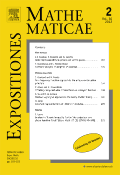
EXPOSITIONES MATHEMATICAE
Advancing Mathematical Frontiers with Rigorous ResearchEXPOSITIONES MATHEMATICAE, published by Elsevier GmbH, stands as a significant journal in the realm of mathematics, catering primarily to researchers, professionals, and students. With an ISSN of 0723-0869 and an E-ISSN of 1878-0792, this journal has made its mark in the academic community, boasting a Q2 classification in the miscellaneous mathematics category for 2023, illustrating its prominence within its field. The journal addresses a diverse scope of mathematical topics, encouraging the publication of original research and innovative theories while maintaining rigorous academic standards. As it converges from 2004 to 2024, EXPOSITIONES MATHEMATICAE continues to be an essential resource for advancing mathematical knowledge and fostering scholarly communication, despite being a non-open-access publication. Its location in Munich, Germany further anchors it within a rich intellectual tradition, providing accessibility for the mathematical community worldwide.
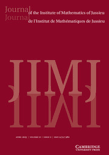
Journal of the Institute of Mathematics of Jussieu
Exploring Innovative Ideas in Mathematical SciencesJournal of the Institute of Mathematics of Jussieu, published by Cambridge University Press, is a leading academic journal that has established itself as a vital resource in the field of mathematics. With an impressive impact factor and a ranking in the top quartile (Q1) of miscellaneous mathematics, the journal serves as a platform for high-quality research from both established scholars and emerging researchers. Spanning from 2002 to 2024, the journal aims to foster collaboration and innovation in the mathematical community by publishing original research articles, reviews, and critical discussions on a wide range of mathematical topics. Although the journal does not offer open access, it remains widely accessible through various academic institutions and libraries, ensuring that critical advancements in mathematics are shared with a global audience. Located in the United Kingdom at the prestigious Cambridge campus, the journal reflects the rigorous standards of its publisher and the rich academic tradition of its home institution.
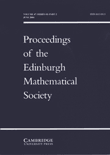
PROCEEDINGS OF THE EDINBURGH MATHEMATICAL SOCIETY
Advancing mathematical frontiers since 1883.PROCEEDINGS OF THE EDINBURGH MATHEMATICAL SOCIETY, published by Cambridge University Press, stands as a cornerstone within the realm of mathematical research, providing a platform for original papers that push the boundaries of various mathematical disciplines. With a rich history dating back to 1883, this journal has evolved through several converged years, reflecting the dynamic nature of mathematical inquiry. As a Q2 category journal in the field of Mathematics (miscellaneous) according to the latest rankings, it situates itself within the upper tier of academic publications, offering an essential resource for researchers and professionals alike. While it currently does not offer open access options, the journal's contributions are invaluable, facilitating dialogue and collaboration among scholars. The journal's commitment to advancing mathematical knowledge makes it a vital publication for those engaged in the study and application of mathematical theories and principles.
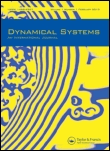
DYNAMICAL SYSTEMS-AN INTERNATIONAL JOURNAL
Transforming Theoretical Insights into Practical ApplicationsDynamical Systems - An International Journal, published by Taylor & Francis Ltd, serves as a vital resource in the fields of mathematics and computer science applications. With an ISSN of 1468-9367 and E-ISSN 1468-9375, this journal has established a significant presence since its inception in 1996 and continues to contribute valuable insights through 2024. Although it holds a Q3 ranking in both Computer Science Applications and Mathematics (miscellaneous), it is a platform for disseminating innovative research and applications relating to dynamical systems analysis and theory. Despite recent challenges reflected in its Scopus rankings, with percentiles at the 30th and 10th for general mathematics and computer science applications respectively, the journal remains committed to fostering interdisciplinary perspectives and providing a forum for the exchange of ideas among academics, professionals, and students. Open access options ensure that research findings reach a broader audience, enhancing the journal's impact and relevance in a rapidly evolving field.
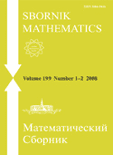
SBORNIK MATHEMATICS
Fostering Critical Discoveries in Algebra and BeyondSBORNIK MATHEMATICS is a distinguished journal dedicated to advancing research in the field of mathematics, particularly focusing on areas such as algebra and number theory. Published by the esteemed Steklov Mathematical Institute of the Russian Academy of Sciences, this journal has been a prominent platform for scholarly communication since its inception in 1993 and continues to thrive with contributions of significant relevance through 2024. The journal maintains a Q2 ranking in both the algebra and number theory category as well as in miscellaneous mathematics, highlighting its competitive standing in the mathematical community. While it is not an open-access publication, it offers critical insights and innovative research that are vital for mathematicians, researchers, and students alike. With an ISSN of 1064-5616 and an E-ISSN of 1468-4802, SBORNIK MATHEMATICS serves as a crucial resource for anyone looking to deepen their understanding of contemporary mathematical developments.

Ukrainian Mathematical Journal
Connecting Researchers Through Quality ScholarshipThe Ukrainian Mathematical Journal is a prominent academic publication in the field of mathematics, focusing on a diverse range of topics that appeal to researchers, professionals, and students alike. Published by Springer, this journal has been an important platform for disseminating significant mathematical research since its inception in 1957. With the aim of fostering knowledge and collaboration within the mathematical community, the journal curates high-quality articles that meet rigorous scholarly standards, evidenced by its Q3 ranking in the miscellaneous mathematics category for 2023. Although it currently does not offer open access, the journal remains accessible through various institutional subscriptions. It serves as a vital resource for ongoing discourse in the field and invites contributions that further advance mathematical understanding.

JOURNAL OF THE EUROPEAN MATHEMATICAL SOCIETY
Advancing Mathematical FrontiersThe JOURNAL OF THE EUROPEAN MATHEMATICAL SOCIETY, published by the EUROPEAN MATHEMATICAL SOCIETY (EMS), stands as a premier platform in the field of mathematics, known for its rigorous editorial standards and impactful contributions to both applied and theoretical aspects of the discipline. With a commendable Q1 ranking in both Applied Mathematics and Miscellaneous Mathematics categories, alongside a Scopus rank of 32 out of 399 in General Mathematics, this journal has established itself as a crucial resource for researchers and professionals. Since achieving Open Access status in 2021, it has expanded its reach, making cutting-edge research more accessible to a global audience. With a publication horizon extending from 2002 to 2024 and a dedicated focus on high-quality mathematical scholarship, the journal continues to foster innovation and collaboration within the mathematical community.
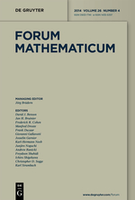
FORUM MATHEMATICUM
Fostering Knowledge: Your Gateway to Mathematical MasteryFORUM MATHEMATICUM, published by WALTER DE GRUYTER GMBH, is a distinguished academic journal based in Germany, known for its significant contributions to the field of mathematics. With an ISSN of 0933-7741 and an E-ISSN of 1435-5337, the journal features comprehensive studies ranging from applied mathematics to diverse mathematical disciplines. Having maintained a commendable presence since 1989, FORUM MATHEMATICUM has achieved notable classification rankings, including Q2 in Applied Mathematics and Q1 in miscellaneous Mathematics as of 2023. Additionally, it holds a Scopus rank within the top 60th percentile in General Mathematics, making it a prominent platform for researchers and professionals seeking rigorous analysis and innovative methodologies in mathematics. While the journal does not currently offer open access, its rich content is pivotal for advancing mathematical theory and applications, appealing to students and seasoned academics alike.